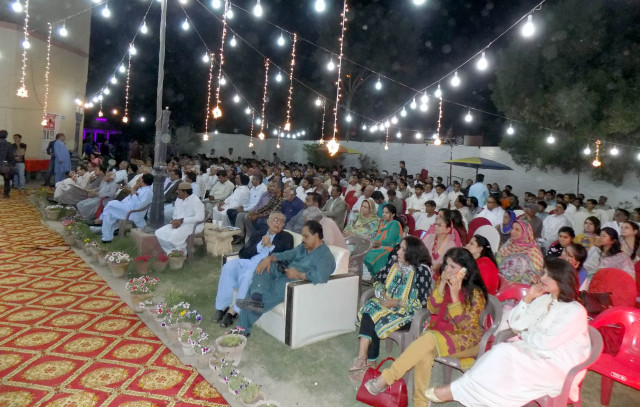Remembering the struggle of Sindh's students
Tribute paid to leaders on 50th anniversary of student movement of 1967

Civil society came out in solidarity with the pioneers of the student movement. PHOTO: ADEEL AHMED/SINDH EXPRESS
Marking the 50th anniversary of that day, people from all walks of life gathered at a ceremony on Sunday to pay tribute to the then students who are now senior citizens. The event, organised by the Human Rights Commission of Pakistan's regional incharge, Dr Ashothama Luhano, columnist Imdad Chandio, journalist Mahesh Kumar and Niaz Soomro, took place at Cafe Khanabadosh in Hyderabad.
Past
"I feel happy that our movement is getting recognition," remarked former Sindh advocate-general Muhammad Yousuf Laghari, who, being the president of SU's student union, was a mainstay of the campaign. "This recognition is actually about the injustice Sindh and its people, language and culture suffered."
Journalist movement: Second edition of Ahfazur Rehman’s book launched
He recalled that on March 5, 1967, some newspapers reported that he has died during the riots. "But I am still alive," he said with a sly grin.
The movement started in reaction to former Hyderabad commissioner Masroor Ahsan's removal of then SU vice-chancellor Hassan Ali Abdul Rahman, recollected former provincial secretary Shamsuddin Memon.
According to him, the movement sparked when nationalist students Laghari and Mujeeb Peerzado were elected as presidents of the student unions at SU and its neighbouring engineering college, now named Mehran University of Engineering and Technology.
"Both of them were known as strong opponents of Ayub Khan's One Unit system," he recalled. "The commissioner thought the VC was patronising the unions and so he removed him."
PSP announces formation of student wing
For the students, the commissioner personified Khan's authoritarian military rule. On March 4, they planned a rally in Hyderabad to vent their anger against the commissioner, as well as the One Unit system. They embarked on buses in Jamshoro to reach Hyderabad but were stopped on the way after crossing the Kotri Barrage, arrested in their hundreds and imprisoned in the Central Jail for a few days.
Some Urdu-speaking students also signed up for the protest in solidarity. "We began wall-chalking at Tilak Charhi [a locality in Hyderabad] in support of the movement. But I and my friend Inayat Kashmiri were arrested and locked up at the Market police station," reminisced Hidayat Hussain, a research consultant, during his speech. "This [wall chalking] was a small contribution but it won us many friends among the Sindhis."
He lamented that in those days a majority of the educated Urdu-speaking people, despite living in Sindh, remained aloof from political concerns and struggles of Sindhis. "After 1954, Sindh disappeared from the world map. March 4 was pivotal to restoring it," he commented.
MQM, PTI hold separate events to pay tribute to APS victims
Lawyer Ali Akbar Brohi spoke about differences among the students, some of whom had suggested limiting the movement against the commissioner while others pressed to expand its ambit against the One Unit system. He said 1,100 students were jailed but released two days later due to political pressure created by mass incarcerations.
In recognition of the movement, former prime minister Zulfikar Ali Bhutto declared March 4 as a public holiday, which was marked from 1972 to 1974.
Present
"Sindhis have kept forsaking and forgetting their heroes. This is one of the reasons for our present condition," bemoaned Laghari, who argued that the prevailing circumstances also call for a strong political movement to wring rights of Sindh and Sindhis from the rulers.
Sindh University: Dr Fateh Burfat takes charge as VC
He believed that 50 years down the line, he does not see much change as far as the rights and condition of Sindh and its people are concerned. He suggested that the representatives of lawyers, journalists, writers and intellectuals should form an overarching organisation and name it the 'Sindh Council'. "The lawyers, writers and journalists have their presence in every small town of the province. They have the capability and network to organise the people for a new political movement," he asserted.
"We need a movement like 1967 now," argued Aijaz Qureshi, another contemporary of Laghari.
Communist leaders Jam Saqi and Qazi Khizar Hayat, who also participated in the movement, spoke at the ceremony.



















COMMENTS
Comments are moderated and generally will be posted if they are on-topic and not abusive.
For more information, please see our Comments FAQ